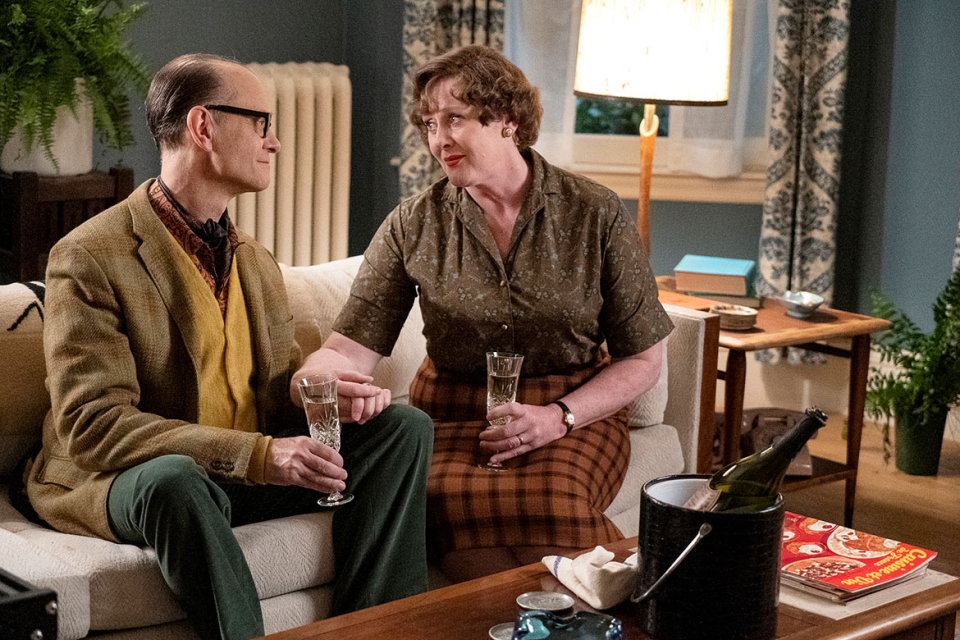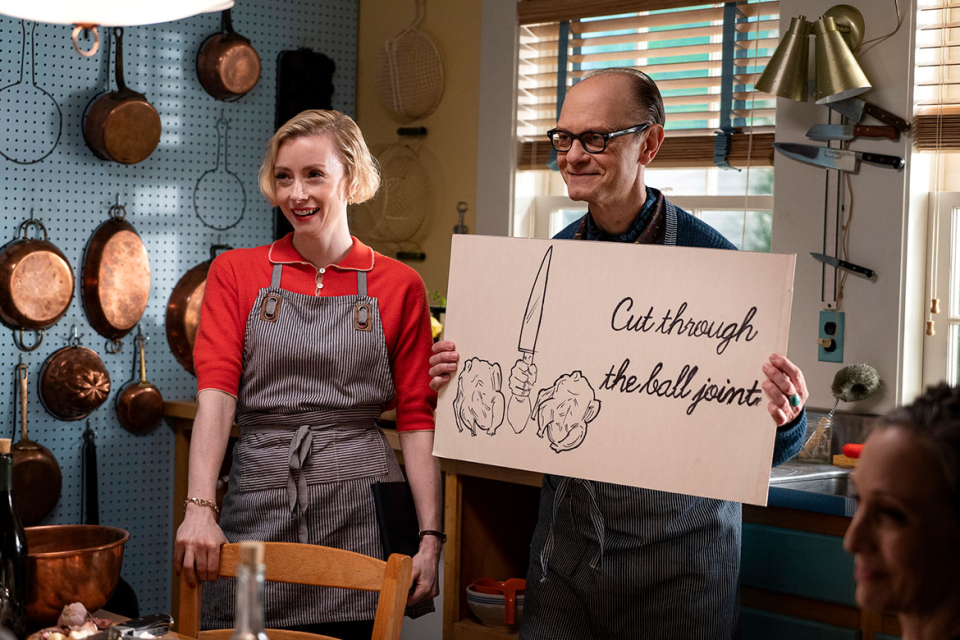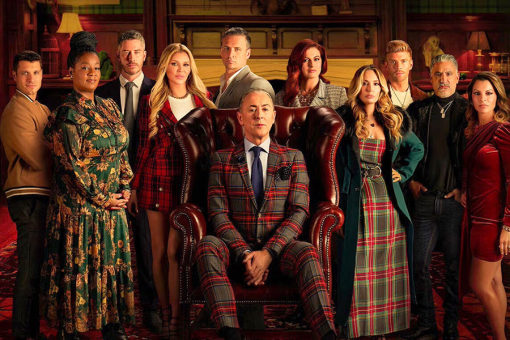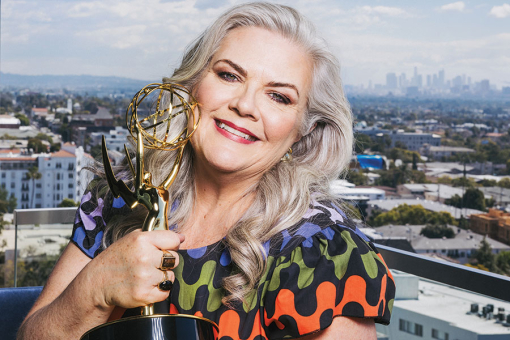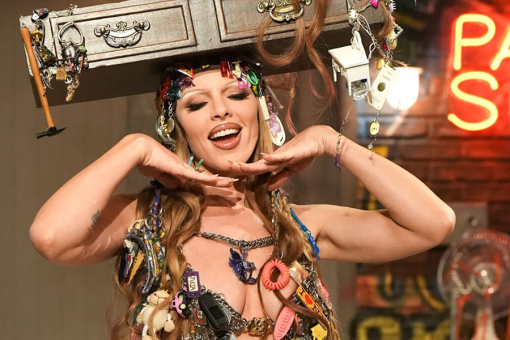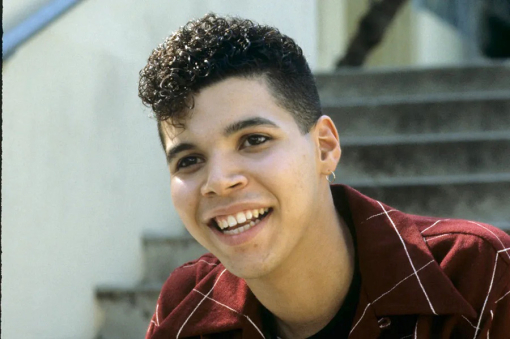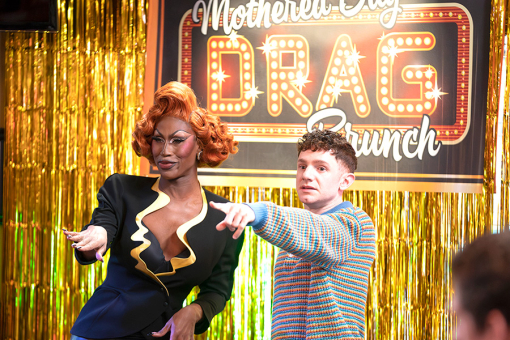In The French Chef Cookbook, Julia Child describes her husband Paul Child as "the man who is always there: porter, dishwasher, official photographer, mushroom dicer, onion chopper, editor, fish illustrator, manager, taster, idea man, poet and husband." And in the first season of the HBO Max series Julia, David Hyde Pierce — who portrays Paul — sources all these ingredients and more.
Indeed, Paul sustains Julia (Sarah Lancashire, Happy Valley) in myriad ways — as she releases her first cookbook, The Art of French Cooking; creates her first cooking show, The French Chef, for PBS; and grapples with her growing prominence — even while his own star begins to fade.
"That fascinated me," Pierce says. "Especially at that time [in the 1960s], for a man and woman to have that kind of role reversal. And he dealt with it beautifully, from what we know publicly. The writers of this show have imaginatively explored that complicated and rich relationship — that he was very supportive, but he wasn't Mother Teresa." (Viewers will see more of Pierce as Paul Child when Julia returns for a second season.)
Best known as stuffy psychiatrist Niles Crane in the long-running sitcom Frasier — a role that won him four Emmy Awards and seven more nominations — Pierce is again playing an art and culture enthusiast, an aficionado of fine dining and expensive wines and a partner who, above all, adores his significant other.
He spoke with emmy's Sarah Hirsch about the connections between the two roles, the decadent dining on the set of Julia and his research into the veteran diplomat who introduced his wife to the wonders of French cuisine.
"He was a complicated little man," Pierce says of Paul, "and that's a fun thing to play."
How much did you know about Paul — and Julia, for that matter — prior to this project?
Not that much. I knew of Julia from television. My mom may have watched her show, so as a little kid I would have seen it. But I was certainly aware of her over the years. I didn't know anything about Paul until they sent me the pilot. When they asked me to play the role I started reading up on him, and I was really amazed by what I found.
What was it about Paul that made you want to sign on?
Most of all, it was the relationship between him and Julia. These were two very strong, unique personalities, who loved each other dearly and were very supportive of each other. And Paul taught her so much about food, wine and French culture — these became the seeds for what she ended up doing with her life.
You play wounded pride so well. You did that as Niles on Frasier, and you get to do it again in this role.
Paul suffered from the frustration of never having achieved what he had hoped as a diplomat, always feeling like he wasn't getting the recognition he deserved. From what I know about him, he was extremely proud and could be kind of difficult.
Daniel [Goldfarb, creator–executive producer] and Chris [Keyser, showrunner–executive producer] told me that some of the original crewpeople from The French Chef said that when Paul first came on set, he was a bit of a martinet. I think that was both his personality and he was protecting Julia — he was not going to let anything be less than what she deserved.
He has...it's hard to...I never know whether to talk about him in the past tense — the real Paul — or in the present tense as the Paul of our show. But he has a great deal of pride and I think he was — from what I've read — a very interesting person, a great storyteller at parties. But he also had a dark side and could be persnickety and stubborn.
How much is known about his role in the production of The French Chef? In the show we see him creating the French bread recipe, and he aids in set construction. Was that embellished or true to life?
You picked two things that were extremely true to life. He did get highly involved in the bread chapter for book two because he was so mathematical and precise, and he looked at it as a big chemistry experiment. I'm not sure how much Julia's book editor, Judith, was also involved in that process [as it's portrayed in the series]. So that may have been a little bit of a stretch, in terms of storytelling. And I actually love the series for that because, as it says, it's based on a true story.
He had their kitchen counters at home rebuilt so that Julia wouldn't hurt her back because she was so tall [six-foot-two]. And he was adamant about that for the kitchen at PBS as well. They just built standard cabinets without thinking.
You had very little source material on Paul, particularly film. As you developed the character, did you find that freeing or challenging?
I found it freeing. We have about thirty seconds of a guest appearance he made on one of her early black-and-white shows — he's pretending to call her, says he's bringing over a friend, and could she possibly make dinner spur of the moment. That was huge to see, because I could get how he spoke, which was kind of an upper-crust, Boston Brahmin dialect. Some people even thought he was English.
There are some parallels between Paul and Niles. Was it difficult to create something new for a character who shares similarities with a signature role?
That's what was most interesting to me about him — and the challenge for me playing him. There are so many aspects of [Paul] that are in the same ballpark [as Niles]. He was an expert on wine, loved fine food and spoke French. So there's all that cultural stuff. But he also climbed mountains and worked with his hands. And I was just reading something that said he took great pride in being able to handle heavy suitcases. And that's an important part of his character that I don't want to get lost in my playing of him or even in the writing, because it's easy to get into the fussy, highfalutin aspect. But he had both.
This show also deals with gender norms, "traditional" husband and wife roles and the burgeoning women's movement. Is it fair to say the show reflects the current state of those social issues through the lens of 1960s ideals?
I absolutely think that's fair to say. As we're having this interview, the world seems to be perched on the edge of war. And I look at it and I think, it just comes in cycles. We all think we're past whatever x is, and we're never past whatever x is; the pendulum keeps swinging back and forth. What's traditional becomes unconscionable, and then one day it becomes desirable again, and on we go.
Actually I will make this parallel with the writing on Frasier: when the writing is true, and the writing about the relationships is true, then I think the material and the context of it becomes universal and sort of perennially relevant. And I think that's what these writers have done.
Yes, there are these issues that sort of socially and politically keep raising their heads. But through it all is this specific issue of how people relate to each other. Do they love each other? Do they help each other? How do they work together? What does it mean to create something out of thin air, to take your life and turn it into a work of art? Those are things that I think are recurrent. And hopefully as long as the world keeps recurring, they will also recur.
Something that wasn't recurrent at the time but was actually trailblazing was the very concept of doing a cooking show, which is inherently comedic now that we have entire networks devoted to food and cooking [not to mention cooking competition series The Julia Child Challenge]. So switching gears now to the subject of food, what was your experience of the cooking that took place — did Sarah do any of it?
We have an amazing chef, Christine [Tobin], on the show who actually cooks most of the food that has to be ready for us.
But I was blown away the first time that Sarah cooked. Because this was not someone pretending to be a cook — she has all the skills, which I think she learned at her mother's knee. And watching her effortlessly make an omelet on a big old gas stove with no tools at all, just flipping it and plopping it on the plate, and dousing it with parsley and serving it up...it was delicious.
That's a whole aspect of the character that Sarah may have had to hone or reacquaint herself with. But it's in her bones, as it was with Julia.
Did you learn anything about cooking by doing this show and being immersed in this subject matter?
Oh, gosh. That's a good question. Have I learned anything? Well, as you go through some of those recipes, you learn — as Julia did as her career went on — that you can kill people with this food. It's so rich — the butter and the cream — all that stuff in traditional French cooking. So it's fun to look at those recipes — and adjust them slightly.
But we all go through life in a blur, and this is about stopping time. When you take the time to make something, to think of what you're going to have, it's a luxury. Take the time to appreciate what is sustaining you, whether it becomes an elaborate art like it did with Julia, and with French food and other cuisines, or whether it's just eating the simplest thing. You fry an egg and you pay attention, you take a bite and you pay attention. We don't do that in modern society; it's very rare.
One thing I learned about Paul was that he was a very fine visual artist. And I hadn't drawn since I was a little boy, but I went back to drawing. And that is an incredibly time stopping art where you focus on something, especially anything that's complex or has texture, and you just disappear into it for days, weeks, months, years — as long as it takes to create it.
Were any dining scenes particularly memorable?
There was a scene in a Chinese restaurant where I found out after the fact that I had eaten sixty dumplings. And it felt like it, too! But I wasn't paying attention because the dumplings were delicious and not very big. And when you've got a lot of people in the scene and you've got master shots, you do the scene many times.
Theoretically you can spit things out, but that is so contrary to everything that we're doing. On the set of an elegant restaurant with a beautiful steak in front of you, the idea of taking a bite of this perfectly cooked, mouthwatering thing and then going, blech, into a bucket — I just couldn't do it. The poor wardrobe department! I can't keep eating that stuff or I'm going to have to start playing James Beard, and that's not my role.
Over the course of the season, Julia reckons with her growing celebrity. Can you relate to what she was feeling, particularly in respect to your years on Frasier? I know that you were and continue to be a theater actor, but television has that wider reach.
I hadn't thought of it in that way, but you're absolutely right. There's a certain kind of acknowledgment you get on stage in New York, but going on television is a whole different animal. And people recognizing you is kind of fun, and then losing your privacy is kind of not that fun. And dealing with the business side of it is completely foreign for most of us who were actors and not producers.
There's a parallel there — you can think of doing theater as the years when Julia was at Le Cordon Bleu learning to cook and writing her book. And there's a parallel for me, David, having had a good chunk of time as a relatively well-known person on American television for eleven years. And here comes Sarah, well known in Britain, but not in America. And I can see there's going to be a lot of attention and success. So I can understand the feelings of both sides. Either that or I'm just at an age when everything feeds whatever character I'm playing.
Frasier fans will be happy to see you sharing a screen again with Bebe Neuwirth [who plays Julia's best friend Avis DeVoto here and played Frasier's ex-wife Lilith on Frasier]. What was that like for you, reuniting with her?
We have so much fun in this show. And I think Bebe was cast before I was, so they didn't know that we would be playing opposite each other in these roles. But they had already implied a certain antagonism between the two characters, which they just ran with. And, of course, it gets more complicated and wonderful than just that. It's just nice to have a — I won't say old friend — but a friend around when you're away from home.
Next year, Frasier celebrates its thirtieth anniversary. How do you feel about the show all these years later?
Are you kidding? Thirty years? Wow! Golly. I was just at this event in Palm Springs and [Frasier cocreator] David Lee did a presentation of the pilot episode where he described how the show was created. And aside from seeing dear John Mahoney [the actor, who played patriarch Martin Crane, passed away in 2018] and all of us [on screen] looking twelve years old, it was amazing to hear how much care and thought went into every decision they made. And I thought, that's why people still watch it. Thirty years — how 'bout that?
Would you care to comment on the potential reboot or your involvement?
My feeling is, I'm involved with this woman, on Julia, so I don't want to talk about any other women.
Fair enough. Thank you, David.
Thank you.
The executive producers of Julia are Daniel Goldfarb, Christopher Keyser, Kimberly Carver, Erica Lipez, Charles McDougall and Erwin Stoff. Catch-up viewing is available on HBO Max.
A condensed version of this interview appeared in emmy magazine issue #7, 2022, under the title, "Taste Maker."


